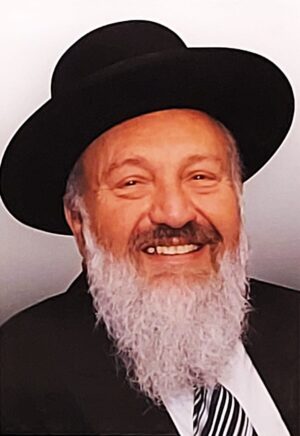Parshat Pekudei:
Rabbi Paysach Krohn relates the following story in his book ‘In The Footsteps of the Maggid’:
It seems that when Rabbi Yisrael (Lipkin) Salanter (1809-1883), the father of the Mussar (ethical improvement) Movement passed away, he was just about penniless. He left very few, if any, material possessions to his surviving descendants.
There was, though, one man in Rabbi Yisrael’s neighborhood who managed to get hold of Rabbi Yisrael’s hat as no one else seemed to want it. The hat was old, creased, and misshapen from years of wear. Yet this man treasured it and wore it every Shabbat. At first people in his shul paid no attention to the hat, but eventually they began to ridicule him about it.
“How can you wear such a thing?” they asked in derision. “It is so dirty, worn, and tattered. To wear that hat is a lack of respect for the holy day of Shabbat!”
The man gazed at these people and replied softly. “Would you agree that there is a certain ‘hiddur’ (extra refinement) in being particularly careful not to speak Lashon Hara on Shabbat?”
The people didn’t understand the relevance of the question but they agreed, “Yes, being careful not to speak Lashon Hara on Shabbat certainly is honoring the day.”
“Then you should know,” continued the gentleman, “that when I wear Rabbi Yisrael’s hat, I find it impossible to speak a word of Lashon Hara!”
In this week’s Parsha we are once again told about the clothing of the priests, and the unique clothing of the High Priest. In Parshat Tetzaveh we were informed that this clothing was to be Le’Chavod Ule’Tifaret – for honor and glory.
If you have similar viewpoints to me, perhaps you have difficulty understanding the concept of wearing ‘clothes of honor’. I strongly believe that the external is irrelevant; it is the inner being that is important.
It is unfortunately not uncommon to find someone who is rotten to the core, yet clothed in dignified garb. Examples could include someone who is dressed as super religious but whose actions are clearly not those of an orthodox person, or a businessman or politician, with their suits and ties, who behave in an ignoble way.
And then conversely, there are people who perhaps on the outside do not look anything special, but in their quiet, modest, way, significantly change the world for the better – without fanfare, honor or glory.
Perhaps I can share a personal story that may give some insight into this concept of ‘clothes of honor’. For the first few months of my married life I was staying in an apartment not too far away from the Yeshurun Synagogue in Edgware, where the late Dayan Gershon Lopian zt”l was the Rabbi. I would go there every morning to daven Shacharit before returning home and getting ready for work.
Now, I am not a morning person. I find it very difficult to part from my warm cozy bed, and while davening with a minyan is also important to me, getting up an hour before davening to prepare properly was too much for me. So I would roll out of bed just a few minutes before the minyan, throw on sweatpants and a hoodie on top of my pyjamas, and stumble into shul, still groggy and half asleep.
After this has been going on for a few weeks and the Dayan had, in his own unique way, built up a rapport with me, something happened that had a massive impact on me.
At the end of the service, the Dayan approached me, put his arm around me and said in a gentle voice, “Someone as great as you shouldn’t be dressed like they just rolled out of bed. Someone as great as you should dress as befitting your greatness!”
I still vividly remember my thoughts at that moment and thinking back brings tears to my eyes – not because I was upset at the reproach, on the contrary it was done with such love and care. In that moment the only thing flashing through my mind was, ‘the great Dayan thinks I’m great!’
I was a young, recently married, guy, I’d learnt just a few years in Yeshiva, was working now as an optometrist. I didn’t think of myself as anything particularly special – there were definitely much more learned people around, and much better optometrists too!
And yet, the Dayan could see through all my self-perceived mediocrity to the jewel inside. And he was also teaching me an important lesson. While it is true that the external appearance isn’t the most important, there is a reality that our internal self perception and self worth can sometimes be connected to how things appear on the outside. When we dress in a way that reflects the greatness within, we are more likely to live up to that greatness. If I wear the clothing of a great person (even if, in the story with Rabbi Salanter’s hat, the clothing is battered) I am more likely to feel I need to behave like a great person.
I don’t like being called Rabbi. I would also prefer to be walking around in comfortable sweatpants! But the reality is that when people view me as a Rabbi and when I dress like a Rabbi, I am more likely to live up to what being a Rabbi means. I have to behave in a certain way – in my case I can’t really get away with speaking Lashon Hara anymore, because I will be jumped on by people saying things like, “I would have thought someone who teaches about negative speech would be more careful about…”
This is what clothes of ‘honor and glory’ means. Clothes through which you honor your internal greatness, clothes that help you live up to the dignified entity that your soul innately is. The priests were the conduit through which the Children of Israel connected to their Father in Heaven. They needed to constantly remind themselves, in a clear and visible way, that they had something to live up to. And while it is true that there are some who hide their terrible behavior behind their external appearance, more often than not, the way we dress becomes the way we behave.
(Picture of Dayan Gershon Lopian zt”l)

